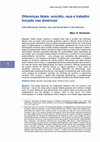Papers by Marc Adam Hertzman
A Contracorriente: Revista de Historia Social y Literatura en América Latina, Jun 15, 2015
In his seminal essay "Our America," José Martí wrote, "The history of America from the Incas to t... more In his seminal essay "Our America," José Martí wrote, "The history of America from the Incas to the present must be taught in clear detail and to the letter, even if the Archons of Greece are overlooked. Our Greece must take priority over the Greece which is not ours." 2 Martí's call to arms, written in the twilight of Spanish Empire and just before the United States would impose its will on the shape and outcome of Cuba's thirty-year independence struggle, took on new meaning for me last year while teaching in one of the few remaining required core curricula in the United States. To a historian of Latin America, the prospect of narrating "western civilization" from Plato to the present is daunting in its own right; making good on Martí's exhortation while doing so seems all but impossible.
Revista Mundos do Trabalho, Nov 5, 2019
A New History of Race and Music in Brazil, 2013

Ce dossier est consacré aux formes narratives du post-esclavage, cette période complexe suivant l... more Ce dossier est consacré aux formes narratives du post-esclavage, cette période complexe suivant l’abolition formelle de l’esclavage. Il interroge ce concept à travers des récits de vies individuelles (celles d’anciens esclaves), produits tant par la littérature, le cinéma, la traduction, la mobilité que par des associations militantes anti-esclavagistes. Les analyses croisent et confrontent les représentations fragmentées et normatives du post-esclavage, en en soulignant la polyphonie, voire la cacophonie. This special issue is devoted to the narrative forms of post-slavery, the complex period following the formal abolition of slavery. It interrogates this concept through the narratives of individual (ex-slave) lives, as they are (re-)circulated in literature, film, translation, movement and militant anti-slavery associations. The contributors cross-reference and confront fragmented and normative representations of post-slavery, thereby highlighting its polyphony, even cacophony

Hispanic American Historical Review
This article examines a group that has received little scholarly attention: the Indigenous people... more This article examines a group that has received little scholarly attention: the Indigenous people of Palmares, the site of one of history's largest fugitive slave communities, defeated by the Portuguese in 1695. What studies do exist emphasize origins: Did Indigenous people help build the fugitive settlements of Palmares? I instead focus on the post-1695 period, when competing actors sought land in the interior regions that the settlements once occupied. Shaped by displacement and diaspora, during the eighteenth and nineteenth centuries some Indigenous people rebelled, while others referenced their role as conquerors of Palmares to make land claims. Though discursive representations of Indigenous roles as conquerors rarely prevented material dispossession, the communities persisted despite remarkable challenges. Their trajectories indicate new ways to think about Palmares and Indigenous history and provide suggestive points of comparison with Spanish America and better-known exa...

Hispanic American Historical Review, 2010
This article discusses strategies which Afro-Brazilian men used to distance themselves from demea... more This article discusses strategies which Afro-Brazilian men used to distance themselves from demeaning assumptions and stereotypes attached to slavery and vagrancy in Rio de Janeiro. The piece focuses on the first 50 years after abolition (1888) but also shows how the ideologia da vadiagem—a set of ideas and stereotypes which defined black, poor, and mixed-race men and women as lazy and inferior—cast a long shadow deep into the twentieth century. The primary lens is the music market, which, beginning around the turn of the century, provided one of the earliest and most public venues in which black men were judged as members of a free society. Some musicians played samba and a number used malandragem, the lifestyle and ethos of flashy, masculine, malandro hustler figures, to cater to audience desires and also to distinguish themselves from caricatures of sickly, weak vadios (vagrants or idlers). Other artists rejected malandragem or only embraced it selectively, instead preferring a m...
Luso-Brazilian Review, 2010
Canadian Journal of History
Esclavages & Post-esclavages

Mundos do Trabalho
Neste ensaio, examino a relação entre raça e suicídio nas Américas. Mostro como as ideias sobre s... more Neste ensaio, examino a relação entre raça e suicídio nas Américas. Mostro como as ideias sobre suicídio ajudaram a gerar e reforçar várias formas de diferença racial e demonstro como as ideias coloniais sobreviveram por muito tempo após a independência e a abolição da escravidão, geralmente em novas formas. A historiografia existente sobre suicídio enfatiza respostas morais, religiosas e médicolegais à autodestruição. Menos atenção foi dada à raça ou ao fato brutal, amplamente reconhecido (embora raramente discutido em profundidade) pelos estudiosos da escravidão, que a servidão forçada também transformou o suicídio em uma questão essencialmente econômica – uma ameaça aos resultados dos plantadores e comerciantes e uma ameaça à produção. À medida que a escravidão e o trabalho forçado se tornavam sistemas de valores globais dominantes que determinavam quem contava como humano, a capacidade de perecer pelas próprias mãos se tornou um meio de vencer essa determinação. Em algum momento...
Hispanic American Historical Review
The American Historical Review










Uploads
Papers by Marc Adam Hertzman